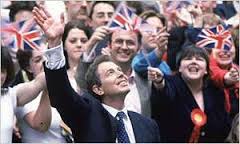
On this day 18 years ago, Tony Blair’s New Labour won a landslide victory in the general election, with a staggering 419 seats and a majority of 179 over all the other parties.
A BBC exit poll that predicted the landslide was described as akin to “an asteroid hitting the planet and destroying practically all life on Earth”. As the results started to come in it was clear that the Tories would be swept out of office after 18 years in power.
The most memorable event was the defeat of Tory poster boy Michael Portillo, shown live on television in the early hours of the morning, later referred to as “The Portillo Moment.” The result elicited a huge roar at Labour’s celebration party and D:Ream’s chart-topper “Things can only get better” was played.
As the sun shone that morning, Blair strode along Downing Street, shaking hands with flag waving supporters from his party. At the door to No.10, he said: “We were elected as New Labour and we will govern as New Labour.”
In context: Blair’s triumph was the culmination of a process that went back to the dismal defeat under Michael Foot in 1983. Labour’s left wing manifesto pledged unilateral nuclear disarmament, withdrawal from the EEC and nationalisation. Ironically Blair entered himself Parliament at this election.
Under new leader Neil Kinnock, the left was gradually subdued and Militant Tendency driven out of the party. Even so the Tories won a majority of over 100 seats in 1987. By the late eighties Blair was one of the key party “modernisers” along with Gordon Brown and Peter Mandelson.
Labour’s narrow defeat at the 1992 election (which it had expected to win) led to the modernisation “project” gaining impetus. Under Blair’s leadership shibboleths such as public ownership of the economy, high taxation and wealth redistribution were dropped in favour of a programme that embraced neoliberalism and the Thatcher revolution of the eighties.
Shortly before the 1997 election the party published “new Labour, new Britain, new life for animals”, which made numerous promises on animal protection issues and said “Labour is the only party with carefully researched policies and the political will to carry them out.”
What happened next: Blair was true to his word and governed as New Labour, being “intensely relaxed about people getting filthy rich.” When Formula One was exempted from the ban on tobacco sponsorship of sport after Bernie Ecclestone’s £1m donation to the party, it was rocked by a sleaze scandal. Sleaze never went away and Blair was interviewed by the police in his final year in office over allegations that party donors had been given peerages.
The burgeoning financial services industry, based in the City of London, led to the rise of a new ultra-rich class. As wages for ordinary people flatlined, Labour tried to plug the gap with tax credits. Middle income people felt better off thanks to rising house prices and personal debt increased to record levels, paving the way for the credit crunch of 2007-8.
Under New Labour, the marketisation and privitisation of key public services such as the NHS and education was stepped up thanks to public finance initiatives (PFI), which the party had condemned while in opposition. Blair also broke his promise to abolish zero hours contracts. Compulsory work placements (workfare) and work capability assessments for disabled people were brought in under Labour.
Blair promised to be “tough on crime, tough on the causes of crime” but in reality it was the former with over 3,500 new offences created and the prison population up by over 30%. ASBOs were particularly controversial with many people being locked up for trivial reasons. A compulsory ID card scheme was announced but later scrapped by the coalition government.
Dissent was criminalized with the term “domestic extremist” used to smear activists and the formation of the National Public Order Intelligence Unit leading to an unprecedented infiltration of political groups by undercover cops. The animal rights movement came off worse, especially anti-vivisection groups such as SHAC who were targeted by new draconian laws.
Labour broke nearly all its promises in New Life for Animals. Fur farming was eventually outlawed in 2003 but the fur trade expanded thanks to the use of injunctions against protesters. After much hesitation and deferment, the Hunting Act 2005 was supposedly intended to ban hunting with hounds but was ineffective and poorly enforced.
Blair ‘s nadir was the disastrous invasion of Iraq and its aftermath. Millions marched against the war but were ignored as he joined forces with George Bush under the pretext of WMDs which were never found. This led to the UK being a prime target for terrorists and the 7/7 bombings. Nearly half a million people died during and after the war and the destabilization of the region was a prime cause of the rise of Islamic State.
New Labour was Thatcherism rebranded with a smiley face and Cool Britannia. According to Larry Elliot, economics editor of the Guardian, its legacy was: “Inequality at levels not seen under Macmillan, Heath, Thatcher or Major. Real cuts in the incomes for those at the bottom of the pile. No progress in reducing child or pensioner poverty. A record number of working-age adults without children living below the breadline.” And on top of that, state repression at home and war without end abroad.